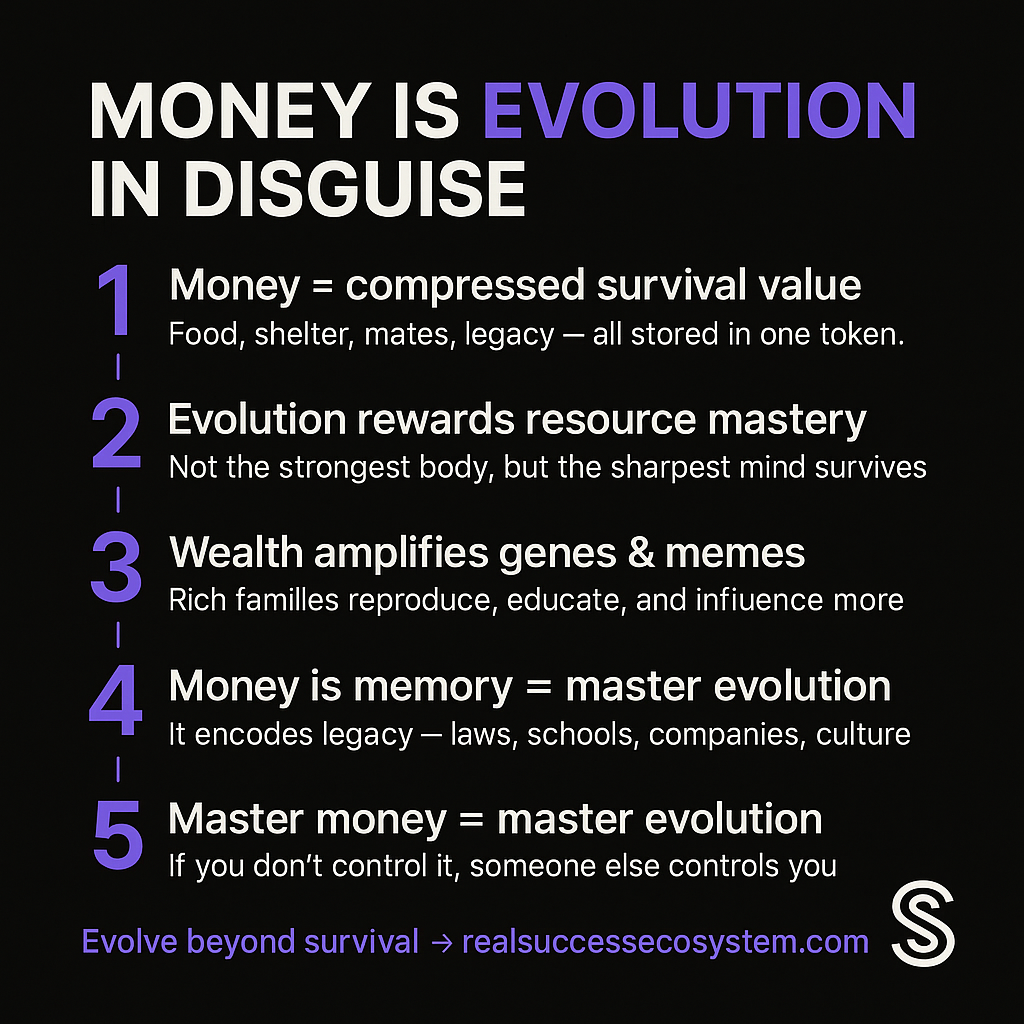
Most people think of money as a tool, a means to buy things, maybe a measure of success if they’re bold enough to admit it. But that’s a child’s view. Money isn’t just a tool — it’s evolution’s newest test. A scoreboard. A filter. A survival mechanism disguised as currency. And once you see this clearly, you won’t be able to unsee it.
Let’s strip the illusion.
Once upon a time, survival meant physical power, access to food, safety from predators. Then it meant land, family name, perhaps favor from the gods or kings. But now? Survival — and not just biological, but societal, legacy-based survival — has a new avatar: money.
Why? Because money is the most compressed, transferrable, scalable form of stored survival value humanity has ever created. One dollar may as well be a spear, a seed, a school, a home, a mate. It holds within it the potential of all those things. And just like nature once selected for strong limbs or cunning minds, it now selects for something far more abstract — your ability to attract, manage, and multiply this compressed resource.
That’s not capitalism. That’s evolution, refined.
See, wealth isn’t just about luxury anymore — it’s a genetic amplifier. A cognitive mirror. A cultural transmitter. In other words, those who learn how to create, sustain, and wield money shape the evolutionary path of our species — biologically, psychologically, and socially.
Let me explain.
In primitive times, resources were direct. You caught the food or you starved. You built the shelter or the cold claimed you. But today, money acts as a proxy for all those things. And evolution didn’t stop. It adapted. Now, the people who command resources don’t have to hunt with spears — they hunt with strategies. They don’t gather berries — they gather cash flows.
You might think this is unfair. That it shouldn’t be this way. But evolution doesn’t care about fairness. It cares about function. It rewards what works — and right now, what works is your ability to navigate the invisible economy that governs almost every decision you make.
The most adaptive no longer have the sharpest teeth… but the sharpest minds.
Wealth correlates tightly with foresight, discipline, risk-awareness, and the ability to project abstract models into future outcomes — all higher-order cognitive traits. Traits that evolution, if it could speak, would reward with quiet approval. And it has. Historically, the wealthiest lineages reproduce more, live longer, educate better, and extend their influence further.
But it doesn’t stop with genes. It continues through memes — cultural DNA.
Money doesn’t just buy life. It buys legacy. It funds schools, shapes governments, builds companies, creates narratives. A rich man’s ideas outlive him — his name etched into law firms, libraries, even entire cities. While a poor man’s wisdom often dies with him, unrecorded, unremembered.
In that sense, money is more than matter. It’s memory. It’s evolution’s hard drive.
So when people tell you money doesn’t matter, ask yourself who benefits from that belief. Because if you don’t master it, you’re not just opting out of wealth — you’re opting out of influence. You’re handing over the evolutionary joystick to someone else.
And yes, this is uncomfortable. Because it means the stakes are higher than we’ve been told. But it also means your power is greater than you’ve been led to believe.
If you can learn to think in terms of systems, if you can train yourself to handle capital as both symbol and tool, if you can evolve your mindset from consumer to creator… then you can transcend the passive role most are stuck in. You stop being a pawn in evolution’s game. You start becoming a player.
Because in this new era — survival doesn’t go to the strongest.
It goes to the most sovereign.
